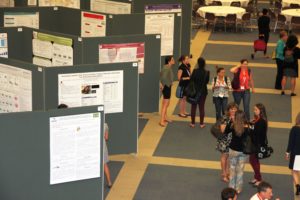The 5th meeting of the International Chair on Cardiometabolic Risk held this year in Québec City, Canada just came to an end. Once again this year, the organizers managed to gather the best researchers and speakers working in several disciplines relevant to preventive medicine. This year, the focus of the 5-day meeting was set on chronic societal cardiometabolic diseases and their prevention. Chronic diseases nowadays account for the vast majority of deaths in developed and developing countries, which is an ever-growing concern for the scientific and medical communities. The meeting brought together physicians, scientists, health professionals and graduate students from several countries to present the latest science on chronic cardiometabolic diseases and their prevention and to find solutions together that will help us in our fight against the epidemics of diseases associated with our modern way of living.
I have attended most of the previous meetings of the Chair and thought that this last one really enlarged the scope beyond the fields of cardiology and diabetology. We did witness great lectures from world-renowned specialists who highlighted exactly how our Western way of living puts us at risk for atherosclerosis, heart failure, valvular heart disease, arrhythmias, hypertension as well as glucose intolerance, non-alcoholic fatty liver disease, type 2 diabetes, etc. But what is becoming increasingly recognized is the impact of poor lifestyle habits on other aspects of our health such as cancer incidence, sleep apnea, chronic obstructive pulmonary disease, cognitive function, renal failure, etc. Among the other new and refreshing messages that we heard, the influence of underappreciated determinants of cardiometabolic health beyond physical activity and diet such as the built environment and socioeconomic determinants were discussed.
This year, the Jean Vague/Per Björntorp award lecture was presented by Dr. Robert Ross, from Queen’s University in Kingston, Ontario, Canada. Dr. Ross emphasized on the importance of physical activity and exercise for the management of abdominal obesity and the prevention of glucose intolerance and type 2 diabetes. He has also presented new analyses from his recent study on the effect of exercise dosing on abdominal obesity and glucose tolerance by showing that both exercise intensity and amount had a trivial impact on body weight but had a substantial effect on visceral fat mobilization measured by computed tomography. One of the conclusions of his lecture was that one should not judge the efficacy of exercise based on its impact on body weight, which has been often done by the lay press. Dr. Ross, along with many other speakers emphasized that if any metric of body composition should be used to monitor cardiometabolic health, it should be waist circumference, which does respond to physical activity and healthy dietary habits changes.
The conclusive statements of the meeting were made by the host of the meeting, Dr. Jean-Pierre Després from Université Laval in Québec City. Dr. Després emphasized that we have made substantial progress in our management of chronic diseases for instance by treating cardiovascular risk factors such as cholesterol, hypertension and glucose intolerance. However, physicians and health professionals do not assess lifestyle-related risk factors for chronic diseases and even worse, they do not target them. Clearly, lack of financial and human resources is a recurrent problem in the management of cardiometabolic risk and not considering cardiometabolic health globally by assessing behaviours has a negative impact on the health of millions of individuals. Let’s hope that events like this and the upcoming ones will increase public awareness on the importance of lifestyle-related factors for the prevention and the management of chronic societal cardiometabolic diseases.

